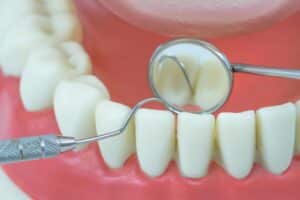Every Australian has their own oral health challenges, but one issue that seems to persist across all demographics is tooth decay. Tooth decay isn’t just uncomfortable, it can have a seriously adverse impact on your overall oral health. Lifestyle and dietary factors and aging can all contribute to tooth decay, so it’s important that you watch out for any signs so you can act quickly. In this blog, we explore the causes and stages of tooth decay and discuss how we can prevent and treat it effectively.
What is Tooth Decay?
Tooth decay, often referred to as dental caries, is the process that results in a cavity or a hole in the tooth. It begins when plaque, a sticky film of bacteria, builds up on your teeth and produces acids that attack the tooth enamel. Over time, these acids wear down the tooth enamel, causing decay.
What Are the Main Causes of Tooth Decay?
The primary causes of tooth decay can be linked to several factors:
- Poor Oral Hygiene: Not brushing and flossing regularly allows plaque to accumulate and harden, leading to decay. Likewise, not visiting the dentist regularly for professional cleaning can also increase your risk of tooth decay.
- Diet: Consuming foods and drinks high in sugars and carbohydrates feed the bacteria in your mouth, producing acids that cause decay. Some top culprits are sodas, wine and acidic juices.
- Dry Mouth: A lack of saliva, which helps wash away harmful bacteria and food particles, can increase your risk of tooth decay. Dryness of the mouth can be a side effect of several medications or simply due to aging.
- Fluoride Deficiency: Fluoride helps prevent tooth decay by making teeth more resistant to acid attacks. If you grew up without fluoride in your water supply, you may be at a greater risk of tooth decay.
What Are the 5 Stages of Tooth Decay?
Tooth decay progresses through five stages:
- Initial demineralisation: Acid attacks the tooth enamel causing the loss of minerals visible as a white spot on the tooth.
- Enamel Decay: The decay of the enamel forms cavities or dental caries which are small holes in your teeth that need to be filled with your dentist.
- Dentin Decay: The decay reaches the dentin, the layer beneath the enamel causing tooth sensitivity. Tooth decay proceeds at a faster rate when it reaches the dentin.
- Involvement of The Pulp: If left untreated, the decay reaches the tooth’s pulp, which is the inner most layer of your tooth. This results in even more sensitivity, irritation and swelling.
- Abscess Formation: As tooth decay advances into the pulp, bacteria begin to cause infection. Increased inflammation in the tooth may lead to a pocket of pus forming at the bottom of your tooth, known as an abscess. This can be very painful.
How Do You Prevent Tooth Decay?
The prevention of tooth decay is centred around good oral hygiene habits and lifestyle changes. If you want to prevent tooth decay in future here are some important tips:
- Brush your teeth twice a day and floss your teeth once a day.
- Consider a fluoride toothpaste or treatment if you grew up without fluoride in your water.
- Limit your intake of sugary and acidic foods and drinks.
- Drink lots of water to keep your saliva levels up.
- Schedule regular dental check-ups with your dentist to catch early signs of decay.
How Can You Treat Tooth Decay?
Treatment depends on the severity of the decay:
- Fluoride Treatments: In the early stages, fluoride treatments and toothpaste can help restore enamel.
- Fillings: For minor decay, your dentist may use simple fillings to fill in cavities and prevent further decay.
- Crowns: For severe decay, a crown might be used.
- Root Canals: If decay reaches the pulp, a root canal might be necessary.
- Tooth Extractions: In extreme cases, the tooth may need to be removed completely and a dental implant put in its place.
Want To Keep Your Teeth Healthy? Contact Mittagong Dental Care
Tooth decay is more than just a minor inconvenience. It’s a pervasive issue that can significantly impact your oral health and quality of life. However, with diligent care and regular check-ups, it’s a condition that can be effectively managed and treated. If you’re noticing signs of tooth decay, or simply want to keep on top of your oral health, Mittagong Dental Care is ready to assist. Reach out to us today for a comprehensive consultation.

